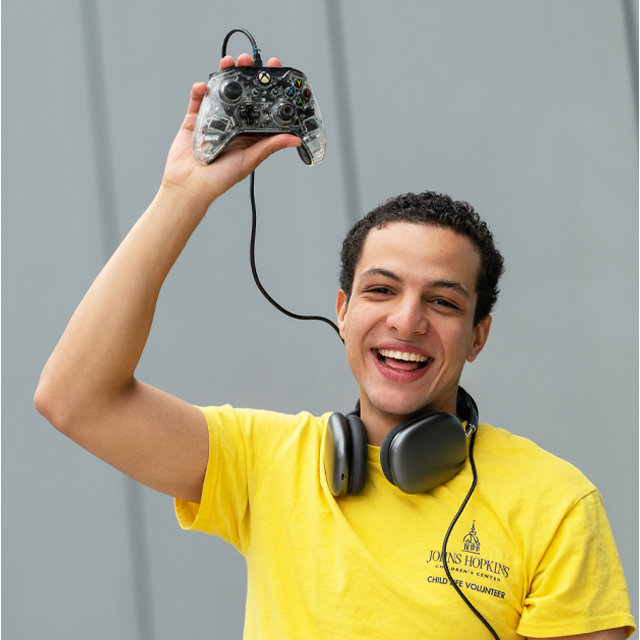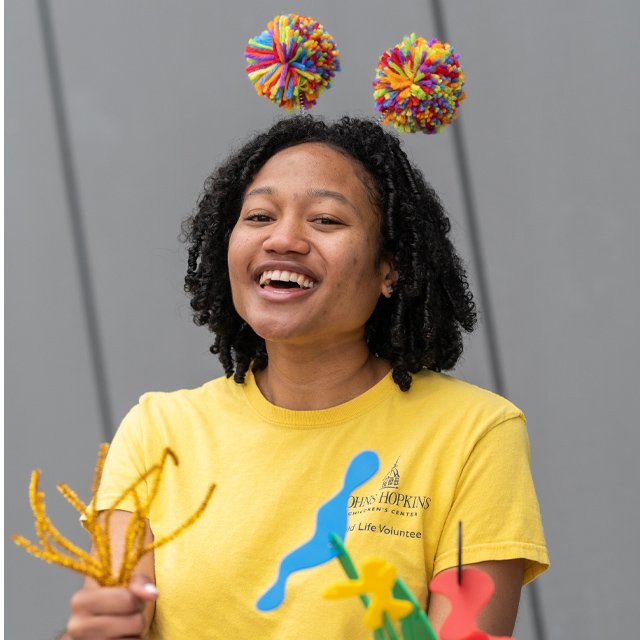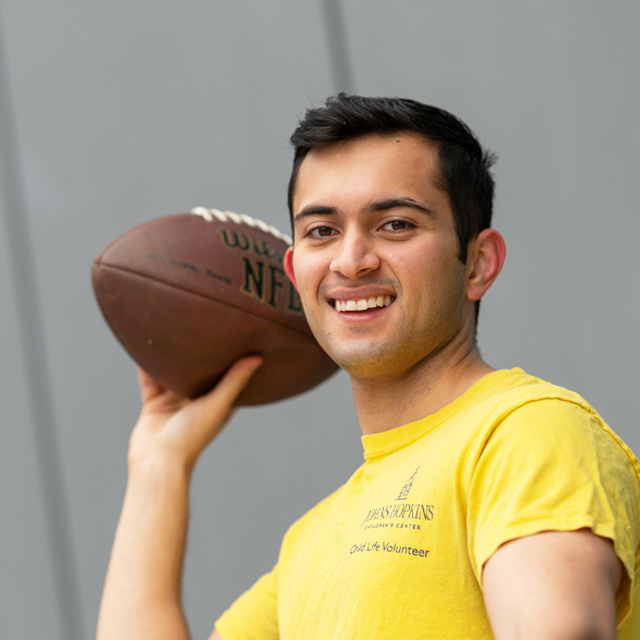For Those Who Wait, Good Things
In the preoperative care unit of Johns Hopkins Children’s Center, nurses and doctors know Josie Connor as the volunteer who plays Red Light, Green Light with kids who zip through the hallways on Little Tikes ride-on cars.
“Green light!” Connor calls out, as she raises the traffic signal prop she created to initiate a mad dash on the fourth floor.
A graduate student in Towson University’s child life, administration and family collaboration program, Connor volunteers weekly to help children awaiting medical procedures and surgeries. “The lull before surgery can be hard and can feel like a long wait for kids and families,” Connor says. “My role is to provide support and use playful activities to help children through a situation that can be stressful and difficult.”
Wait times can extend longer than anticipated, and kids can get bored. Nothing makes time pass more quickly than play, and fun, hands-on activities can offer stress relief to those sitting and waiting anxiously. “I’ve convinced a lot of kids, teenagers, and even parents and guardians to ease the anxiety by keeping their hands busy and creating things with Play-Doh,” Connor says.
Connor says it’s the little things that engage the senses and inspire the imagination — little things like Play-Doh — that make a real difference in a setting such as the preoperative care unit. Coloring books for both children and adults, too, provide opportunities for creative expression and for calm, and Connor makes sure to keep some on hand as she circulates throughout the open-curtain unit.

The lull before surgery can be hard and feel like a long wait for kids and families. My role is to provide support and use playful activities to help children through a situation that can be stressful and difficult.
— Josie Connor
When Connor graduates from her program and earns certification as a child life specialist, part of her job will involve educating kids, teens and their families about diagnoses and treatments, and developing coping plans for those admitted to the hospital. These plans use not only play but also distraction techniques, breathing exercises and guided imagery to reduce fear and to put patients’ minds at ease.
“When I go out into my career, I’ll take with me the many evidence-based techniques and theories I’ve learned in my program, and everything I’ve learned at Johns Hopkins Children’s Center through the amazing mentorship from other child life specialists and the patients and families I’ll never forget,” says Connor.
Finding Escape in Video Games
For Adam Boukind, Friday afternoon is the best part of his week. That’s when he plays Mario Kart, Minecraft and other video games with young patients at the Children’s Center.
One of several child life gaming volunteers, Boukind focuses on fun distractions. “Playing video games is escapism for the children,” says Boukind, a master’s student in biomedical engineering at Johns Hopkins who plans to attend medical school in the fall. “Nothing makes me happier than when I hear the relief in their voice when they forget about being in the hospital.”
Whether for a routine procedure or a more complicated medical issue, being a hospital patient can be both tedious and anxiety-producing. Technology and gaming are important ways that children play today, and gaming has become a core component of the child life repertoire. Boukind and the other gaming volunteers work under the direction of Eric Clarkson, who was hired in 2021 to be the first full-time child life gaming specialist.

“Even if I don’t know them at first, I become part of their family. It’s a very intimate space to be in and a privilege for me to be part of their journey in the hospital.”
—Adam Boukind
Each Friday after medical rounds, Boukind gets a list from Clarkson of patients who want to play video games. Then, Boukind makes his own rounds, pushing a mobile cart filled with iPads, virtual reality headsets and other state-of-the-art technology items that can be used with the Nintendo Xbox Series X console that will soon be in every patient room — thanks largely to the philanthropy of Child’s Play Charity (read more in ‘A Moment of Normalcy’).
Once the patient has selected a game, Boukind settles down to do what he and his friends did while he was growing up in Morocco: hang out, laugh and chatter. Then he repeats the process with the next patient on his list.
Working with children is familiar territory for Boukind. As a teenager, he and his father, a reconstructive surgeon, volunteered with Operation Smile, the global nonprofit organization that provides free surgeries to children born with cleft conditions. His father also treated children with burn injuries. The work left an impact on Boukind, who wants his medical career to revolve around children and, perhaps, burn care.
Boukind says it’s the connections with the patients and their families that he finds most rewarding. “Their resilience is truly inspiring,” he says. “Even if I don’t know them at first, I become part of their family. It’s a very intimate space to be in and a privilege for me to be part of their journey in the hospital.”
‘Play Is the Primary Work’
Sometimes, she kneads a mix of glue, baking soda, water and food coloring to help a child concoct slime at a science station. Other times, she plays rounds of Uno or bounces a baby doll on her knee in a pretend session of “family.” Whatever the scenario, Jacquelyn French spends her weekly four-hour shift at the Children’s Center doing largely one thing: playing.
“Play is the primary work of children,” says French, a second-year graduate student working on a master’s degree in child life, administration and family collaboration at Towson University. French once considered pursuing a doctorate in child development, but she realized how much she enjoys the one-on-one interaction — including playing — with kids. “I’m really a hands-on person,” she says. “I enjoy the theory behind the work, but it’s the applied part, and seeing the smiles on kids’ faces, that I like most.”
But French can readily talk theory. “Being in the hospital and undergoing medical procedures are scary experiences for most kids,” she says. “Plus, it’s easy, as a child, to feel like the adults in the room — the parents and doctors — are the ones making the decisions.” Self-assurance, French goes on to explain, comes from having some degree of ownership and autonomy over one’s life. So French makes a point to weave elements of choice into her weekly play sessions with kids.

“I’m really a hands-on person. I enjoy the theory behind the work, but it’s the applied part, and seeing the smiles on kids’ faces, that I like most.”
—Jacquelyn French
Instead of saying, “Hey, let’s play X or Y,” French asks the open-ended question: “What would you like to play?” And she lets the child take the lead throughout the entire session. For example, if a patient chooses to paint a tree purple or use LEGOs to make pretend soup, she goes along. “My job is really to nurture and comfort,” she says, and to help kids escape or cope with the severity of their circumstances — a process known as “normalizing.”
French’s experience at Johns Hopkins Children’s Center reaffirms her decision to devote her career to helping kids through tough situations. She says she hopes to land a job after she graduates as “a child life specialist with a nonprofit organization that provides disaster relief, where I would get deployed in the aftermath of a disaster like an earthquake or flood.” French would enter the scene with her gentle nature and, likely, a bagful of toys, empowering kids to cope — without forgoing play.
Rocking Babies, Reading Books
Armaan Jamal, a lead research program coordinator at the Johns Hopkins University School of Medicine, spends his workdays probing the etiology and biomarkers of long COVID in people who are HIV positive. But when 5 p.m. rolls around on a Friday, he shows up, like clockwork, to his four-hour volunteer shift at Johns Hopkins Children’s Center, ready to play.
Jamal graduated from The Johns Hopkins University a year early, in 2022, with a bachelor’s degree in molecular and cellular biology, and he is taking a gap year to work and to apply for medical school. While juggling a full-time job in medical science with the time-consuming process of preparing medical school applications, Jamal relies on his weekly play session with patients at the Children’s Center as a stress-busting break that reminds him why he wanted to pursue medicine in the first place.
“Ever since I shadowed a doctor at a hospital in Kenya, where I grew up, I’ve known I wanted to be a physician who works with children, especially those from low-resource areas,” Jamal says. At the government-run Coast General Hospital in his hometown, Mombasa, on the shores of the Indian Ocean, Jamal witnessed pediatric medical care that left a lasting impression. “I watched surgeries conducted on children in outpatient settings, when they should have been in the OR, and I saw kids undergoing treatments who were all alone and crying,” he says.

“I’ve played Jenga, rocked babies, read books, colored pictures and even let a little girl paint my nails neon green.”
—Armaan Jamal
As a volunteer, Jamal plays board games, offers homework help, and engages in art projects with kids and babies admitted to the Children’s Center. “I’ve played Jenga, rocked babies, read books, colored pictures and even let a little girl paint my nails neon green,” Jamal says, laughing. His favorite thing to play is Call of Duty, a video game in which epic battles unfurl across historical and futuristic worlds.
“One night, I played Call of Duty with a teenage boy and his brother for four hours straight, while listening to rap music on their speaker — and just hanging out and having fun,” Jamal says. For the siblings, the evening offered an escape from the gravity of being in the hospital.
The mother of another patient wrote Jamal a letter to thank him for the hours of Mario Kart and Call of Duty, and for simply being there for her son. “I was touched,” Jamal says, “and I believe no kid deserves to be sick.
“This position lets me give back to people at their most vulnerable — but I also get to be a kid again.”
